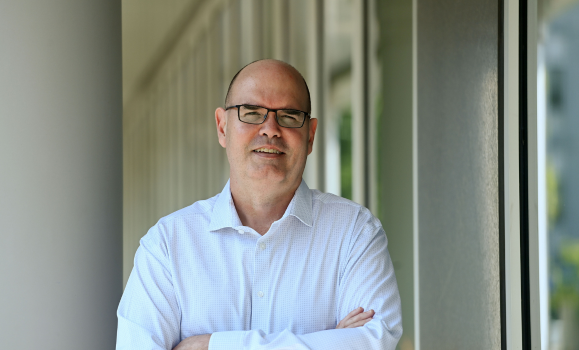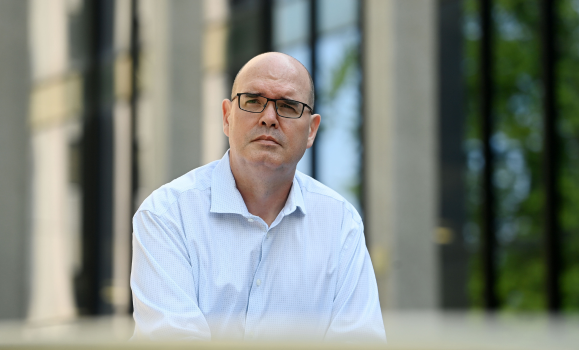Meet department head, Dr. Mark Asbridge

Dr. Mark Asbridge is an experienced academic leader and researcher whose career has been shaped by a deep commitment to public health, education, and collaborative leadership. He completed his PhD and postdoctoral training at the University of Toronto, where he was a recipient of the H. David Archibald Fellowship in Addiction Studies, and a post-doctoral fellowship at the Centre for Addiction and Mental Health in Toronto. He was recruited to Dalhousie University in 2003 to join the Department of Community Health and Epidemiology. His research expertise lies in the areas of addictions, road safety, injury prevention and emergency medicine, and public policy, with a specific focus alcohol and drug-impaired driving.
Over the years, Dr. Asbridge has held several leadership roles, including graduate program director and associate head. In addition to his work at Dalhousie, he has served on various boards and advisory committees at the provincial and federal level, as well as with the World Health Organization. He previously held the Mother’s Against Drunk Driving – MADD Canada Professorship in Impaired Driving Research and Prevention, and a Canadian Institutes of Health Research New Investigator Award.
In 2022, he stepped in as interim head during a colleague’s medical leave and officially assumed the role of department head in January 2025. Known for his thoughtful, people-first leadership style, Dr. Asbridge is focused on fostering faculty success, expanding educational offerings, and strengthening the department’s integration with Nova Scotia Health and other regional partners.

Q: What brought you to Dalhousie, and how did you end up in your current leadership role?
I was recruited to Dalhousie after my postdoc at the University of Toronto, thanks to Dr. Christian Poulin, who used her research chair funding to bring in a junior faculty member in addiction science and substance use. Over time, I took on various roles, including graduate program director and associate head. When Dr. Susan Kirkland had to step away from her duties as head, I returned early from sabbatical to serve as interim head. Eventually, I applied for the permanent role and officially became head in January 2025.
Q: What are your top priorities as Department Head?
I’m really focused on two main things: shaping the department’s direction through a new strategic vision and championing the success of our faculty. I think it's really meaningful to have the opportunity to leave your mark on the direction of the department and help shape its future. But what I find most fulfilling, what makes me proudest, is seeing other people succeed. That means removing barriers, eliminating red tape, and helping people thrive.
We’re also expanding our educational footprint with new programs, including a course-based master’s a graduate certificate offerings, and the introduction of a new medical residency program in Preventive Medicine and Public Health (PHPM), the first new residency program in Nova Scotia in the last 20 years. Another key priority is building stronger collaborations with Nova Scotia Health. People have heard of us, but many don’t fully understand what we do or how we’re connected to the health system—both provincially and nationally. I want to raise awareness of our work and strengthen collaborations, especially with Nova Scotia Health. Although we don’t have practicing clinicians, we’re a clinical department within the health authority, and I also serve as district chief. I’m working with senior leadership to formalize and deepen those connections
Q: What’s been the most challenging part of the role?
Navigating difficult conversations, especially when they involve long-time colleagues, has been the hardest part. Whether it’s delivering bad news or addressing performance issues, it’s not something that comes naturally to me. I’ve been thinking about doing some training in conflict resolution and effective communication to strengthen that skill set.
Q: How does the department contribute to addressing health equity and social determinants of health?
The core question of epidemiology is understanding the distribution of disease in the population—and more importantly, asking why health and disease vary across different groups. That leads us to the study of health determinants and inequalities. While not everyone in the department focuses on this area, many of us dedicate our work to examining inequities in access to care and health outcomes, using lenses like policy, health economics, and health behavior. We also integrate this into our teaching—helping students learn how to study, measure, and address inequities through undergraduate and graduate courses, thesis work, and research projects. Our graduates go on to roles in medicine, public health, government, and research, equipped with a strong foundation in population health, epidemiologic research methods, and critical thinking.
Q: Are you still active in research and teaching?
Yes, though I've chosen to take a less prominent role in research to focus on leadership. While I still collaborate on projects, write, and publish, I'm no longer actively seeking grants or leading my own. Instead, I contribute as an investigator on several grants. I still co-teach a capstone course in the BSc Medical Sciences program, tutor in UGME, and supervise several graduate students. I’m also involved in national research initiatives like CRISM (Canadian Research Initiative in Substance Matters), in partnership with Dr. Sherry Stewart from the Departments of Psychiatry and Psychology and Neuroscience. While I’m no longer leading grants, I continue to collaborate and publish.
Q: What’s one initiative you’re especially excited about?
We’re working to establish a new division in Public Health and Preventive Medicine (PHPM), which will be housed within our department and serve as an academic home for public health physicians across Nova Scotia, New Brunswick, and PEI, something that’s been missing until now. We’re also laying the groundwork for a Royal College residency program in PHPM. The plan is to welcome a few residents each year into a five-year program, with training embedded in community settings and mentorship from practicing public health physicians across the region. Our graduate programs already meet Royal College requirements, including the one-year master’s component in public health or epidemiology, so we’re well-positioned to support this.
There are still financial and structural details to finalize, including appointing a division head but this initiative marks an exciting new chapter for our department and for public health training in Atlantic Canada.
